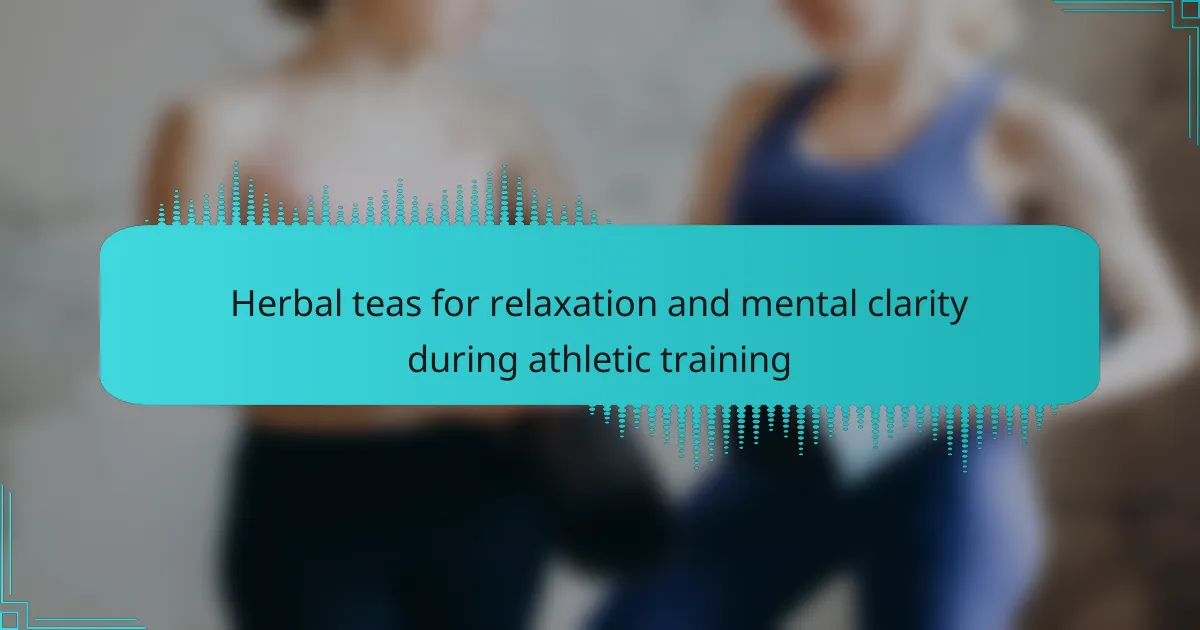Herbal teas can significantly enhance relaxation and mental clarity during athletic training. They provide calming effects, improve focus, and reduce stress. Key options include chamomile for better sleep, green tea for cognitive support, and peppermint to alleviate fatigue. Incorporating these teas into your routine can boost mental resilience and overall training performance.
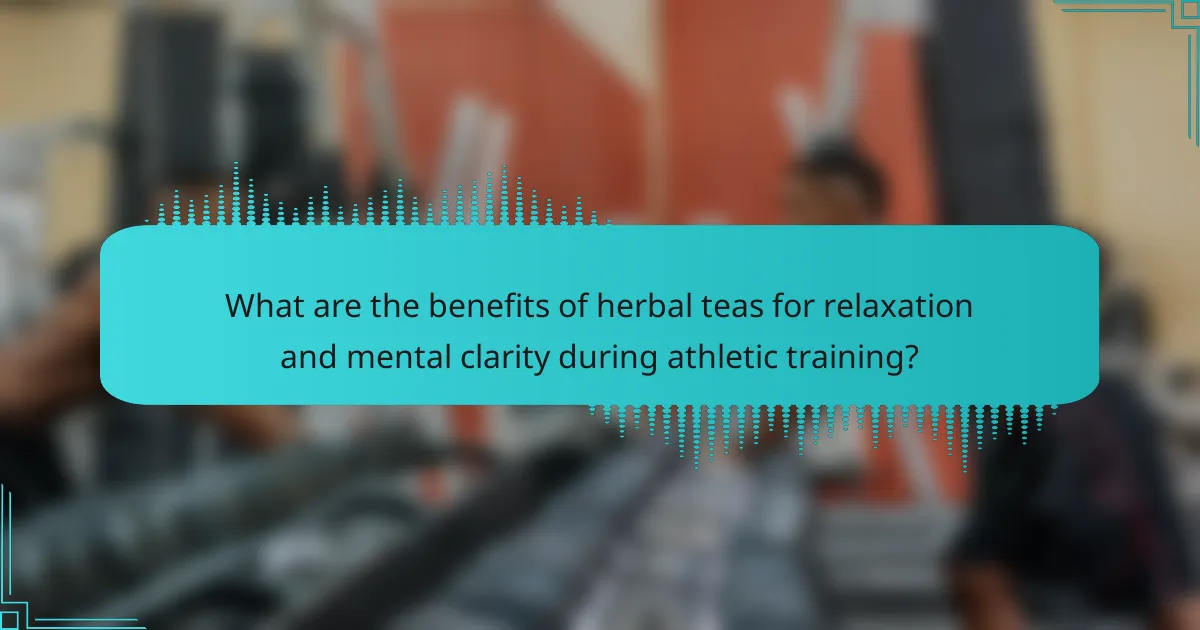
What are the benefits of herbal teas for relaxation and mental clarity during athletic training?
Herbal teas enhance relaxation and mental clarity during athletic training. They provide calming effects, reduce stress, and improve focus, crucial for optimal performance.
Chamomile tea is renowned for its calming properties, promoting better sleep and recovery. Green tea, rich in L-theanine, enhances cognitive function and reduces anxiety, aiding concentration. Peppermint tea can invigorate the mind and alleviate fatigue, supporting endurance during training sessions.
Incorporating these herbal teas into a training regimen can lead to improved mental resilience, allowing athletes to perform at their best while maintaining a sense of calm.
How do herbal teas promote relaxation?
Herbal teas promote relaxation by providing calming effects and reducing stress during athletic training. Ingredients like chamomile and valerian root contain compounds that lower anxiety levels and improve sleep quality. These teas can enhance mental clarity, allowing athletes to focus better on their performance. Consuming herbal teas can also lead to improved hydration, which is essential for optimal physical and mental function.
What role do herbal teas play in enhancing mental clarity?
Herbal teas enhance mental clarity by providing relaxation and reducing stress during athletic training. Ingredients like peppermint and ginkgo biloba improve cognitive function, while chamomile promotes calmness and focus. The unique attribute of herbal teas lies in their ability to combine hydration with natural compounds that support mental performance. Regular consumption can lead to improved concentration and reduced anxiety, ultimately benefiting athletic training outcomes.
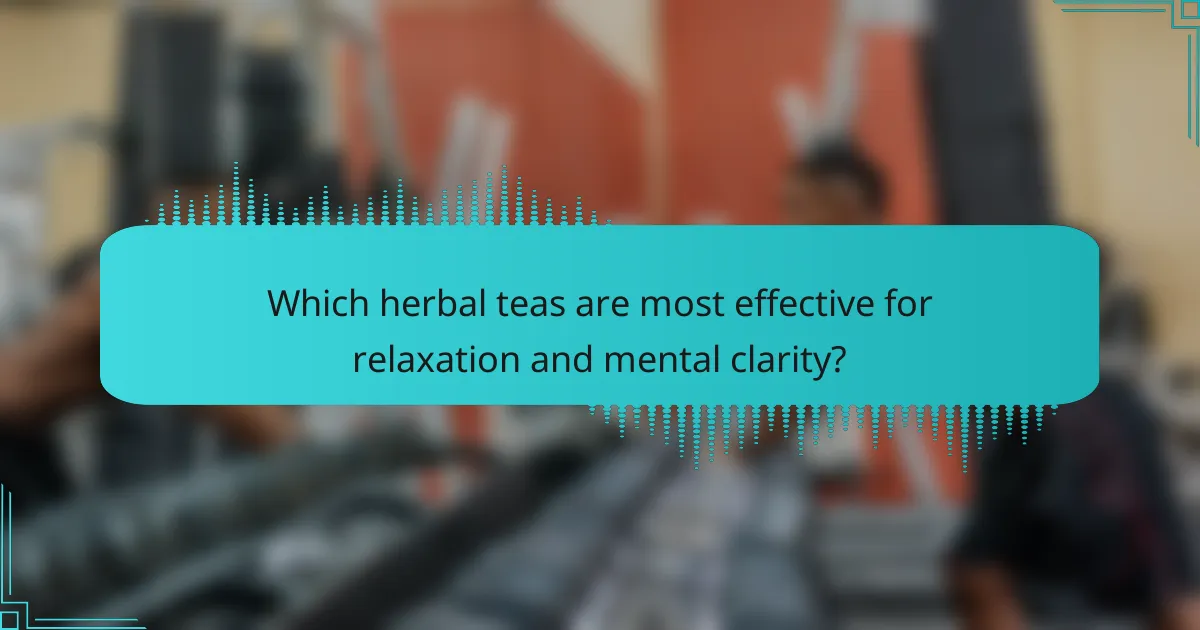
Which herbal teas are most effective for relaxation and mental clarity?
Herbal teas like chamomile, peppermint, and lemon balm are effective for relaxation and mental clarity during athletic training. Chamomile reduces anxiety and improves sleep quality, while peppermint enhances focus and reduces fatigue. Lemon balm is known for its calming effects, which can help maintain concentration. These teas offer natural benefits that support both relaxation and mental clarity.
What are the top herbal teas for relaxation?
Chamomile, peppermint, and lemon balm are top herbal teas for relaxation during athletic training. Chamomile promotes calmness, while peppermint aids digestion and enhances mental clarity. Lemon balm helps reduce stress and anxiety, making it ideal for pre-training. Each tea offers unique benefits that can enhance relaxation and focus.
How does chamomile contribute to relaxation?
Chamomile contributes to relaxation by promoting calmness and reducing anxiety. Its unique attribute includes the presence of apigenin, a compound that binds to brain receptors to induce sleepiness. Research indicates that chamomile tea can improve sleep quality, making it beneficial for athletes during training. Regular intake may enhance mental clarity by reducing stress levels, allowing for better focus and performance.
What are the benefits of peppermint for mental clarity?
Peppermint enhances mental clarity by improving focus and reducing fatigue. Its natural aroma stimulates brain function, which is beneficial during athletic training. The menthol in peppermint increases alertness, aiding in concentration and cognitive performance. This herb can be consumed as tea, providing hydration and relaxation alongside its mental benefits.
Which herbal teas improve cognitive function during training?
Herbal teas such as ginkgo biloba, rosemary, and green tea can enhance cognitive function during athletic training. Ginkgo biloba improves blood circulation, which may boost brain performance. Rosemary contains compounds that support memory and focus. Green tea provides caffeine and L-theanine, promoting alertness and reducing fatigue.
How does ginkgo biloba enhance mental clarity?
Ginkgo biloba enhances mental clarity by improving blood circulation to the brain. This increased flow can lead to better cognitive function and sharper focus. Studies indicate that ginkgo may support memory and attention, making it beneficial during athletic training. Additionally, its antioxidant properties help protect brain cells from oxidative stress, further contributing to mental clarity.
What is the impact of rosemary on focus and memory?
Rosemary can enhance focus and memory due to its cognitive-boosting properties. Studies indicate that rosemary’s aroma may improve concentration and recall, making it beneficial during athletic training sessions. The unique attribute of rosemary is its ability to increase alertness and mental clarity, which can lead to improved performance. Incorporating rosemary herbal tea into a training regimen may provide athletes with a natural way to enhance cognitive function and manage stress effectively.

Are there unique attributes of specific herbal teas?
Yes, specific herbal teas possess unique attributes that enhance relaxation and mental clarity during athletic training. Chamomile tea, for instance, is known for its calming effects and ability to improve sleep quality. Peppermint tea can enhance focus and cognitive function, making it ideal before workouts. Lemon balm tea is recognized for reducing anxiety and stress, which can be beneficial during intense training sessions. Each of these teas offers distinct benefits that cater to the needs of athletes seeking mental clarity and relaxation.
What makes adaptogenic herbs special for athletes?
Adaptogenic herbs enhance athletic performance by reducing stress and promoting mental clarity. These herbs, such as ashwagandha and rhodiola, help athletes adapt to physical demands, improving endurance and recovery. Their unique properties support optimal cognitive function, allowing for better focus and decision-making during training. Incorporating herbal teas into an athlete’s routine can provide a calming effect, aiding relaxation and mental clarity essential for peak performance.
How do rare herbs contribute to relaxation and mental clarity?
Rare herbs enhance relaxation and mental clarity during athletic training by reducing stress and improving focus. Herbs like ashwagandha and rhodiola are known for their adaptogenic properties, helping the body manage stress effectively. These herbs contain unique compounds that promote neurotransmitter balance, leading to improved cognitive function. Regular consumption of herbal teas made from these herbs can result in a calmer mind and heightened mental acuity, essential for optimal athletic performance.
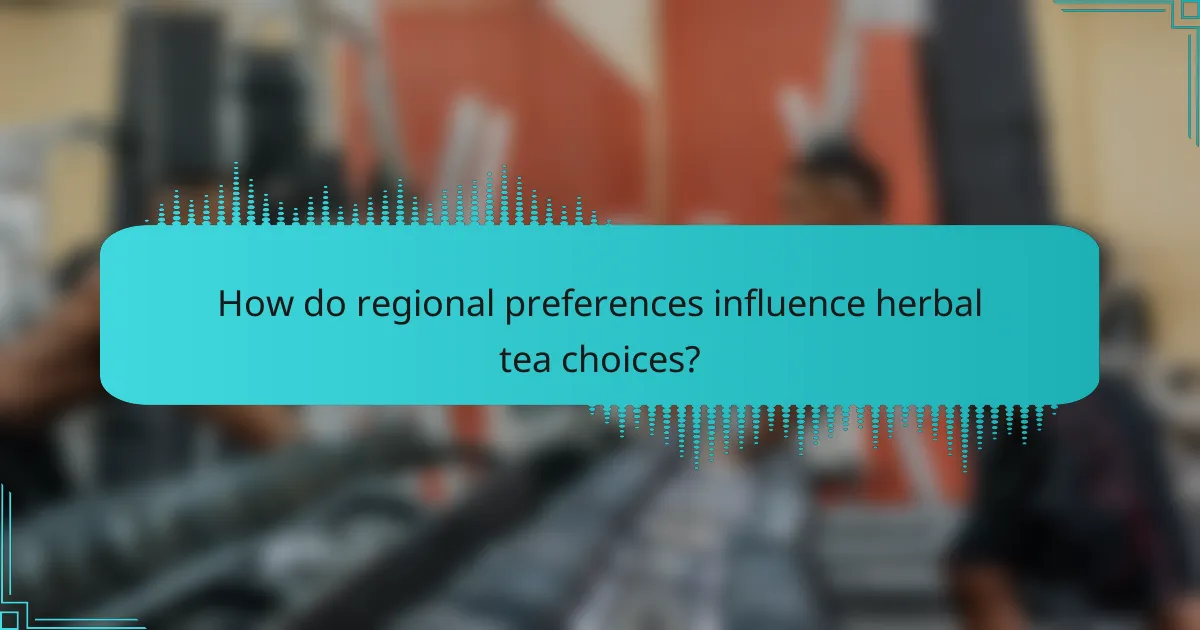
How do regional preferences influence herbal tea choices?
Regional preferences significantly shape herbal tea choices, impacting flavor profiles and ingredient selection. For instance, in Asia, jasmine and green tea are favored for their calming effects, while in Europe, chamomile and peppermint are popular for relaxation. Geographic climate influences the availability of herbs, with specific blends becoming traditional in various cultures. Additionally, local beliefs about wellness can dictate preferences, such as using herbal teas for mental clarity during athletic training. This unique attribute of cultural significance highlights how regional tastes and practices guide the consumption of herbal teas.
What herbal teas are popular in different cultures for relaxation?
Popular herbal teas for relaxation across cultures include chamomile, known for its calming effects; peppermint, which aids in mental clarity; and rooibos, rich in antioxidants. In Asia, jasmine tea is favored for its soothing aroma, while in South America, yerba mate is appreciated for its energizing yet relaxing properties. Each tea offers unique attributes, enhancing relaxation during athletic training.
How do local practices affect the use of herbal teas in athletic training?
Local practices significantly influence the use of herbal teas for relaxation and mental clarity in athletic training. Regional preferences for specific herbs, such as chamomile or peppermint, reflect cultural beliefs about their calming effects. These practices often emphasize the importance of natural remedies, promoting herbal teas as essential components of recovery routines.
Additionally, the preparation methods for herbal teas can vary, impacting their potency and flavor. For instance, some cultures may steep herbs longer, enhancing their beneficial compounds. This unique approach can lead to variations in how athletes experience relaxation and mental clarity during training.
Incorporating local herbal traditions can also foster community engagement among athletes. Sharing knowledge about the benefits of specific herbal teas strengthens social bonds and promotes a holistic approach to athletic training.
Overall, the intersection of local practices and herbal tea usage enriches the training experience, supporting athletes’ mental and physical well-being.
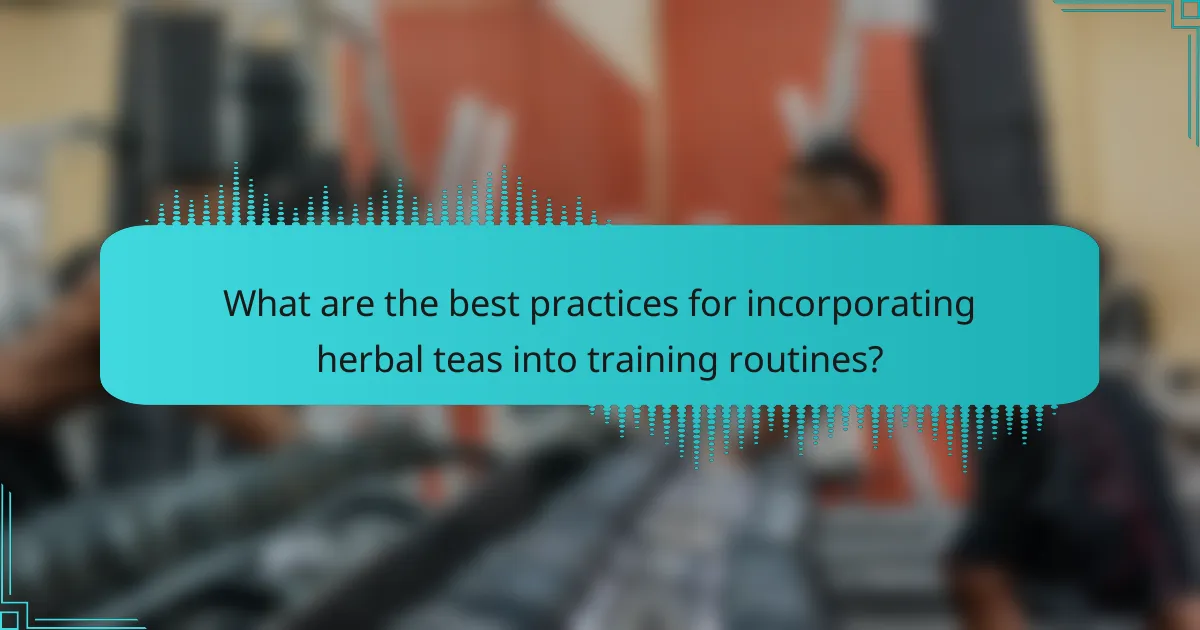
What are the best practices for incorporating herbal teas into training routines?
Incorporating herbal teas into training routines enhances relaxation and mental clarity. Choose teas like chamomile for calming effects or green tea for cognitive support. Timing matters; consume teas post-workout for recovery or before sessions to promote focus. Experiment with different blends to find what works best for your body. Stay hydrated by balancing tea intake with water.
How can athletes optimize their tea consumption for maximum benefit?
Athletes can optimize their tea consumption by selecting herbal teas that enhance relaxation and mental clarity. Teas such as chamomile and peppermint promote calmness, while ginseng and green tea improve focus and cognitive function. Timing is crucial; consuming these teas post-training aids recovery and stress relief. Additionally, brewing methods influence potency; steeping for longer extracts more beneficial compounds. Monitoring hydration levels is essential as well, ensuring tea intake complements overall fluid consumption.
What common mistakes should athletes avoid when using herbal teas?
Athletes should avoid several common mistakes when using herbal teas for relaxation and mental clarity. First, they often overlook the importance of timing; consuming herbal teas too close to training can lead to digestive discomfort. Additionally, athletes may not consider individual sensitivities; certain herbs can cause adverse reactions. It’s crucial to research the specific benefits and potential side effects of each tea. Lastly, athletes sometimes underestimate hydration; herbal teas should complement, not replace, water intake during training.
What expert insights can enhance the use of herbal teas in training?
Herbal teas can significantly enhance relaxation and mental clarity during athletic training. Incorporating teas like chamomile or peppermint can reduce stress and improve focus.
Chamomile is known for its calming effects, helping to lower anxiety levels. Studies show that consuming chamomile tea can improve sleep quality, which is crucial for recovery. Peppermint tea, on the other hand, has been linked to improved cognitive function and increased alertness, making it beneficial before training sessions.
Additionally, green tea contains L-theanine, an amino acid that promotes relaxation without drowsiness. This unique attribute can help athletes maintain mental clarity while staying calm under pressure.
Incorporating these herbal teas into a training regimen can create a holistic approach to performance, combining physical preparation with mental well-being.
